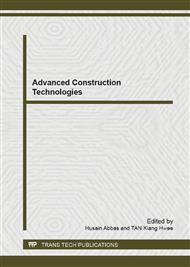p.1075
p.1079
p.1085
p.1091
p.1096
p.1100
p.1104
p.1110
p.1115
Durability Test Research of Asphalt Mixture with Rubber Particles under the Condition of Freeze-Thaw Cycle
Abstract:
Influence of freeze-thaw cyclic on the durability of asphalt mixture with rubber particles was researched by experiment. Based on the typed AC-13 continuous dense graded aggregate, adding the amount of 1%~3% of rubber particles into graded aggregate, the splitting tensile strength and the void fraction of asphalt mixture with rubber particles under the condition of freeze-thaw cycle were measured. The test results show that the splitting tensile strength decreases and the void fraction increases with the increase of the number of freeze-thaw cycle. With the increase of rubber particle content, the splitting tensile strength decreases and the void fraction increases under the same number of freeze-thaw cycle. When rubber particles are added to graded aggregate, the splitting tensile strength of asphalt mixture is reduced to some extent. And when the rubber particle content attains 2%, the TSR (tensile strength ratio) achieves the optimal value.
Info:
Periodical:
Pages:
1096-1099
Citation:
Online since:
April 2014
Authors:
Keywords:
Price:
Сopyright:
© 2014 Trans Tech Publications Ltd. All Rights Reserved
Share:
Citation:


